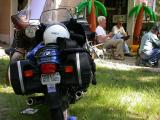Dielectric Grease
- Slashsevenpig
- Posts: 38
- Joined: Tue Aug 03, 2010 7:59 am
Dielectric Grease
Hello All,
I recently bought a tube of dielectric grease. My research indicates a difference of opinion (shocking!) on how to apply it.
In the case of a plug-in, is it applied directly to the spade connector surfaces, or is it applied around the outside of the connection, once assembled?
One theory states the shearing action of assembling the plug will displace enough of the (non-conductive) grease to provide a reliable electrical connection.
Another theory states that since dielectric grease is non-conductive, it should be applied to the outside of a component, after the connection is made.
Does anyone have some personal experience they are willing to share?
I recently bought a tube of dielectric grease. My research indicates a difference of opinion (shocking!) on how to apply it.
In the case of a plug-in, is it applied directly to the spade connector surfaces, or is it applied around the outside of the connection, once assembled?
One theory states the shearing action of assembling the plug will displace enough of the (non-conductive) grease to provide a reliable electrical connection.
Another theory states that since dielectric grease is non-conductive, it should be applied to the outside of a component, after the connection is made.
Does anyone have some personal experience they are willing to share?
Re: Dielectric Grease
Don't know the "correct" answer.
I have always used a small brush to put it on the metal that can corrode. The spade (or bullet) and the receptacle.
Have never had a problem.
I have always used a small brush to put it on the metal that can corrode. The spade (or bullet) and the receptacle.
Have never had a problem.
I've spent most of my money on women, motorcycles, and beer.
The rest of it I just wasted.
The rest of it I just wasted.
- Ken in Oklahoma
- Posts: 3182
- Joined: Tue Aug 03, 2010 5:10 pm
Re: Dielectric Grease
+1 on what Dougie said.dougie wrote:Don't know the "correct" answer.
I have always used a small brush to put it on the metal that can corrode. The spade (or bullet) and the receptacle.
Have never had a problem.
I don't know why a person would want to do it another way, other than not having to clean up a micro "mess".
Ken
____________________________________
There's no such thing as too many airheads
There's no such thing as too many airheads
-
dwerbil
- Moderator
- Posts: 2885
- Joined: Tue Aug 03, 2010 10:58 am
- Location: Round Rock, Texas
- Contact:
Re: Dielectric Grease
Same here. A little dab will do ya. Small brush works well.
I add a bit all over, just to coat it. Should be good to go for many years.
I add a bit all over, just to coat it. Should be good to go for many years.
-
Duane Ausherman
- Posts: 6008
- Joined: Thu Aug 12, 2010 12:39 pm
- Location: Galt California
- Contact:
Re: Dielectric Grease
I make my living in this area and I am the inspector/trainer of the young technicians in how to do this very thing.
When I find grease pasted on the outside of a connection, I know that the tech forgot to put the grease in first and is trying to fake it for the inspector. I like to remove the terminal and I nearly always find no grease in the actual connection. That grease just shows me where the liar was working. I reject it and they get to drive all the way out to do it again. Yep, I am that mean. I could use some of the excess and wipe it on the connection and be done with it. It would take me an extra 5 seconds. I like punishing liars and cheats, as that is what I get overpaid for.
Use the grease to keep oxygen out of the connection. The grease doesn't need to conduct as one might think. It gets squeezed out by the crimping process. Stuff the cleaned connector full of grease. Dip the bare wire in grease. Insert and crimp. Make sure that you have a proper size and type of crimper. BMW failed badly on this aspect of the battery cables. That is why so many failed in the first few years. Shame on their inspection of the contractor.
I prefer to use shrink tubing on the outside of the connector after crimping. It helps keep out oxygen.
This is the only article on my website that I could find on the subject. http://w6rec.com/duane/bmw/terminal/index.htm
I thought that I had more info.
Here is some info http://penforhire.wordpress.com/category/bmw/page/2/
The grease that one slathers around on the outside of a connector just collects dust. It serves no purpose at all.
When I find grease pasted on the outside of a connection, I know that the tech forgot to put the grease in first and is trying to fake it for the inspector. I like to remove the terminal and I nearly always find no grease in the actual connection. That grease just shows me where the liar was working. I reject it and they get to drive all the way out to do it again. Yep, I am that mean. I could use some of the excess and wipe it on the connection and be done with it. It would take me an extra 5 seconds. I like punishing liars and cheats, as that is what I get overpaid for.
Use the grease to keep oxygen out of the connection. The grease doesn't need to conduct as one might think. It gets squeezed out by the crimping process. Stuff the cleaned connector full of grease. Dip the bare wire in grease. Insert and crimp. Make sure that you have a proper size and type of crimper. BMW failed badly on this aspect of the battery cables. That is why so many failed in the first few years. Shame on their inspection of the contractor.
I prefer to use shrink tubing on the outside of the connector after crimping. It helps keep out oxygen.
This is the only article on my website that I could find on the subject. http://w6rec.com/duane/bmw/terminal/index.htm
I thought that I had more info.
Here is some info http://penforhire.wordpress.com/category/bmw/page/2/
The grease that one slathers around on the outside of a connector just collects dust. It serves no purpose at all.
Ask the Indians what happens when you don't control immigration.
Re: Dielectric Grease
You can also find a conductive form of silicone grease, it has what look like metal flakes in it
I have a tube somewhere, I don't really know if it is effective or snake oil.
I have a tube somewhere, I don't really know if it is effective or snake oil.
-
Duane Ausherman
- Posts: 6008
- Joined: Thu Aug 12, 2010 12:39 pm
- Location: Galt California
- Contact:
Re: Dielectric Grease
The grease being conductive isn't important. If the connection is mechanically good enough to initially pass the current without grease, then by keeping out oxygen, with grease, it will stay clean, not corrode and keep conducting.
Choosing the right materials for the connections is key, as is the actual crimping.
This science is quite old.
The only thing that I know of to improve over existing methods is to dip the bare wire in hot grease, so that it wicks up and into the many small hairs of wire. This greatly improves the coating of grease in every little wire of the whole cable. Four ought (4/0) of the flexible stuff (welding cable) that we use has well over 1000 hairs of copper in it. Just coating the outside of 1000 tiny wires doesn't get the grease to coat the inside layers of tiny wires. When the grease is well distributed through out the whole 1000+ wires and then crimped with a thousand pounds of pressure, the grease is well squeezed out of all spaces. This gives a nearly hermatic seal to oxygen, the enemy.
The ultimate test is to check the temperature of the cable and connections while carrying the max loads of current. By hand, one can feel which cable connections are less than perfect.
Sometimes we have to work on this stuff while it is hot. A tool that is mishandled can short out and vaporize. It is quite impressive. We have special tools for this work. I have cheated and have made my own tools.
Many of the technicians refuse to do this work. I usually get these jobs. So far, so good.
Choosing the right materials for the connections is key, as is the actual crimping.
This science is quite old.
The only thing that I know of to improve over existing methods is to dip the bare wire in hot grease, so that it wicks up and into the many small hairs of wire. This greatly improves the coating of grease in every little wire of the whole cable. Four ought (4/0) of the flexible stuff (welding cable) that we use has well over 1000 hairs of copper in it. Just coating the outside of 1000 tiny wires doesn't get the grease to coat the inside layers of tiny wires. When the grease is well distributed through out the whole 1000+ wires and then crimped with a thousand pounds of pressure, the grease is well squeezed out of all spaces. This gives a nearly hermatic seal to oxygen, the enemy.
The ultimate test is to check the temperature of the cable and connections while carrying the max loads of current. By hand, one can feel which cable connections are less than perfect.
Sometimes we have to work on this stuff while it is hot. A tool that is mishandled can short out and vaporize. It is quite impressive. We have special tools for this work. I have cheated and have made my own tools.
Many of the technicians refuse to do this work. I usually get these jobs. So far, so good.
Ask the Indians what happens when you don't control immigration.
-
Major Softie
- Posts: 8900
- Joined: Tue Aug 03, 2010 1:46 pm
Re: Dielectric Grease
Be sure to let us know if you vaporize. It could become all the rage.Duane Ausherman wrote: Sometimes we have to work on this stuff while it is hot. A tool that is mishandled can short out and vaporize. It is quite impressive. We have special tools for this work. I have cheated and have made my own tools.
Many of the technicians refuse to do this work. I usually get these jobs. So far, so good.
MS - out
-
Deleted User 287
Re: Dielectric Grease
It might impact on the Soylent Corporation's profit margin!Major Softie wrote:Be sure to let us know if you vaporize. It could become all the rage.Duane Ausherman wrote: Sometimes we have to work on this stuff while it is hot. A tool that is mishandled can short out and vaporize. It is quite impressive. We have special tools for this work. I have cheated and have made my own tools.
Many of the technicians refuse to do this work. I usually get these jobs. So far, so good.
Re: Dielectric Grease
That could cost Linda a LOT of money.Duane Ausherman wrote: I have cheated and have made my own tools.
If you did indeed vaporize.
Your employer's legal responsibilities to you would diminish.
Lord of the Bings

